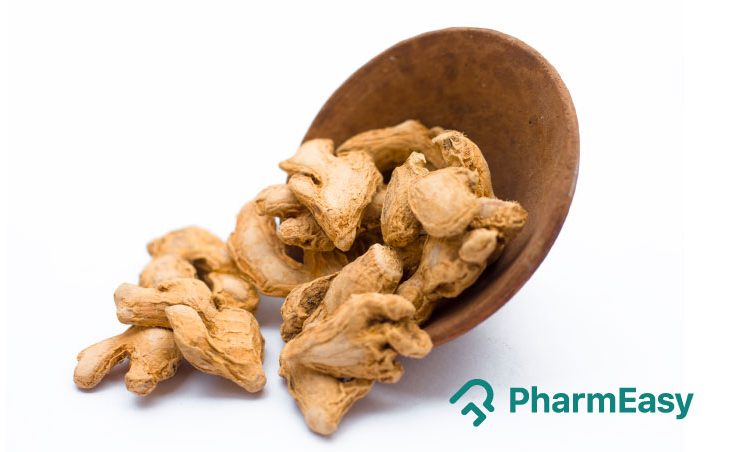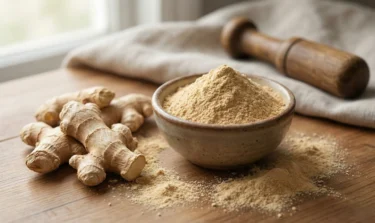Sonth: Uses, Benefits and Side effects by Dr. Smita Barode
By Dr Smita Barode +2 more

Get,

to manage your symptom
Get your,


4 Cr+ families
benefitted

OTP sent to 9988776655



You’ve successfully subscribed to receive
doctor-approved tips on
Whatsapp

Get ready to feel your best.

Hi There,
Download the PharmEasy App now!!


Register to Avail the Offer
Send OTPBy continuing, you agree with our Privacy Policy and Terms and Conditions

Hi There,
Sign up on PharmEasy now!!
Trusted by 4 crore+ families

OTP sent to 9988776655



You have unlocked 25% off on medicines




Code: NU25
By Dr Smita Barode +2 more
Table of Contents
We often see our grandmother recommending us to have sonth when we fall sick. Mainly during the cough and cold, we will have tea prepared with sonth. Sonth is nothing but dried ginger. The scientific name of ginger is Zingiber officinale and it belongs to the family Zingiberaceae. Ginger is a large tuberous perennial plant available in almost all tropical and subtropical nations. Ginger is collected in December or January when the plants have finished flowering and are withered. After removing rhizomes, aerial stems, fibrous roots, and buds were removed. The rhizome is thoroughly washed in running water to remove clay and the rhizome is peeled on a flat surface and between the fingers. Ginger is the primary seasoning ingredient and contains essential oils which enhance the taste. Further, it is used as a seasoning agent in confectionery, soft drinks, and beverages. It is also used in pharmaceutical preparations because it is known to have medicinal properties1,2. Let us look at some of the health benefits of sonth.
The nutritional value of shade-dried ginger is2:

Several studies have shown that sonth may have the following properties:
I highly recommend the consumption of sonth in case of a blocked nose. Sonth might be your ally in aiding sinusitis causing a blocked nose. According to studies, sonth may be administered using fumigation to eliminate germs, bacteria and viruses from the sinus area and relieve the inflammation and clear the blockage to facilitate proper breathing through the nose12.
Dr. Siddharth Gupta, B.A.M.S, M.D (Ayu)
Some of the potential uses of sonth are:

A study3 by Malu et al. in 2008 showed that sonth may be used against bacteria. The study was conducted on bacteria like bacillus, staphylococcus epidermidis and streptococcus viridans. Bioactive compounds in sonth, like sesquiterpenoids and zingiberene, may inhibit the growth of bacteria. However, further studies are required to check if sonth can be beneficial against bacterial infections. Therefore, you must consult your doctor in case of bacterial infections.

A study4 by Sakulnarmrat et al. in 2015 showed that sonth might be beneficial in the case of stomach, colon and breast cancer. Sonth may contain several bioactive compounds like shogaols and gingerol (Phenolic compounds), which may induce apoptosis (kill the cancer-causing cells). Cancer is a dangerous disease and you must consult your doctor if you suspect any symptoms of cancer instead of self-medicating.

A study4 by Sakulnarmrat et al. in 2015 showed that sonth might have antioxidant potential due to bioactive compounds like gingerol and shogaol (Phenols). It may deactivate the free radicals (harmful molecules present in the body) and protect them from various damages. Further studies are required to check the antioxidant activity of sonth.

A study5 by Zhang et al. in 2020 showed that bioactive compounds like gingerol in sonth might help in the case of inflammatory bowel disease (IBD). Gingerol may inhibit the release of inflammatory mediators (molecules responsible for inflammation) and reduce pain caused during IBD. However, further studies are required to check if sonth may be helpful for stomach disorders. Therefore, you must consult your doctor if you experience pain or any discomfort in your stomach.

A study6 by Roufogalis et al. in 2014 showed that sonth might be used in the case of type 2 diabetes due to bioactive compounds like gingerol. This bioactive compound may control lipids and blood sugar levels, reducing the risk of type 2 diabetes. It may additionally lower blood sugar levels and reduce insulin resistance. However, further studies are required to check if sonth can be beneficial in the case of diabetes. Therefore, you must check your blood sugar levels regularly and consult your doctor in case of abnormal blood glucose levels.

A study7 by Helli et al. in 2022 showed that sonth could be used for headaches during migraines. Sonth may reduce the severity and duration of headaches during migraines. However, further studies are required to check if sonth benefits headaches. Therefore, you must consult your doctor if you have a severe headache for a prolonged period.

A study8 by Bera et al. in 2016 on a guinea pig showed that polysaccharides present in sonth might be responsible for reducing cough. A decoction of hot water and ginger powder may be used as a herbal remedy for cough. However, further studies on humans are required to confirm if sonth is beneficial in case of cough. Therefore, you must consult your doctor if you have a cough for a prolonged period.

A study11 by Pagani et al. in 2020 showed that sonth might have anti-inflammatory and analgesic (reducing pain) activity. Sonth may inhibit the release of inflammatory mediators (molecules responsible for inflammation and reducing pain). However, further studies are required to check if sonth may help relieve pain and inflammation. Therefore, you must consult your doctor if you suspect inflammation or feel pain for a prolonged period.
Though studies show the benefits of sonth in different conditions, these are insufficient and there is a need for further studies to establish the true extent of the benefits of sonth on human health.
From the trunk of Ayurveda, Sonth is nothing short of a magical product that may work wonders by slowing down the ageing process with its anti-inflammatory, antioxidant and immunity-boosting properties. Cheers to a youthful and vibrant life with the power of sonth13!
Dr. Rajeev Singh, BAMS
Sonth can be prepared in the following way:
You must consult a doctor before taking sonth in large quantities or any herbal supplements. Likewise, do not discontinue or replace an ongoing modern medical treatment with an ayurvedic/herbal preparation without consulting a qualified doctor.
The side effects of sonth, according to the case study by Shetty et al. in 2005, are:
If you notice any reaction after consuming sonth, seek immediate medical attention. First, consult your ayurvedic physician who has prescribed it to you; they will be able to identify the cause and treat it effectively.
The following precautions can be taken before consuming sonth:
General precautions should be taken while having sonth as any other general medicine. Pregnant women and lactating mothers should take special care. You must consult your doctor before having sonth. Precaution should be taken before giving sonth to the elderly or children. In such cases, you must have sonth only if your doctor prescribes it.
Also Read: Ginger Juice: Uses, Benefits, Side Effects By Dr. Siddharth Gupta
There is not enough scientific information about the interactions of sonth with other medicines. However, people should not assume that there are no interactions at all. Therefore, it is always better to follow the advice of an Ayurvedic doctor. They will prescribe you the best way to take it as a herb.
Sonth can be prepared from ginger in the following ways. Rhizomes of ginger are thoroughly washed and the roots are removed. Rhizome preparation for drying includes either peeling, splitting or slicing. Preparation involves submerging whole coated rhizomes in boiling water for approximately ten minutes before drying. This is how black ginger is prepared. Rhizomes lose 60–70 percent of their weight in moisture during sun drying, resulting in a final moisture content of 7–12 percent10.
Sonth can be used as an antioxidant. It may be used against bacterial infections, stomach disorders, headaches and coughs. It can kill and inhibit the growth of cancer-causing cells. Additionally, sonth may reduce pain and inflammation. It may also lower blood glucose levels3,9. However, you must consult your doctor if you have any symptoms of the mentioned conditions instead of self-medicating.
Sonth may cause gastrointestinal discomfort, nausea and upset stomach (dyspepsia)11 If you notice any reaction to consuming sonth, seek immediate medical attention.
Sonth may contain bioactive compounds like polyphenols, ascorbic acid, zingiberene, sesquiterpenoids, shogaols, gingerol and many more.
Sonth may lower blood sugar levels and reduce insulin resistance. However, you must check your blood sugar levels regularly and consult your doctor in case of abnormal blood glucose levels.
Disclaimer: The information provided here is for educational/awareness purposes only and is not intended to be a substitute for medical treatment by a healthcare professional and should not be relied upon to diagnose or treat any medical condition. The reader should consult a registered medical practitioner to determine the appropriateness of the information before consuming any medication. PharmEasy does not provide any guarantee or warranty (express or implied) regarding the accuracy, adequacy, completeness, legality, reliability, or usefulness of the information; and disclaims any liability arising thereof.
Links and product recommendations in the information provided here are advertisements of third-party products available on the website. PharmEasy does not make any representation of the accuracy or suitability of such products/services. Advertisements do not influence the editorial decisions or content. The information in this blog is subject to change without notice. The authors and administrators reserve the right to modify, add, or remove content without notification. It is your responsibility to review this disclaimer regularly for any changes.
Comments

Leave your comment...
You may also like
Comments